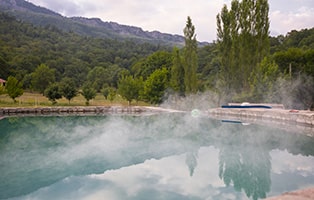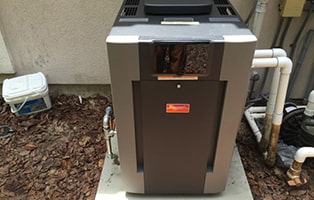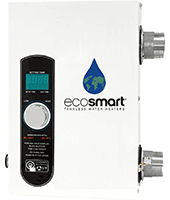 Here are the Best Electric Pool Heaters of 2023 complete with ratings!
Here are the Best Electric Pool Heaters of 2023 complete with ratings!
Can’t wait to heat up your water to pleasantly warm temperatures? If so, get yourself an electric pool heater. These units use heating elements to get water nice and toasty, similar to what tankless heaters do inside a home. Water courses through the unit, which is heated as it passes over the element. The warmed-up water is then shuttled back to the pool.
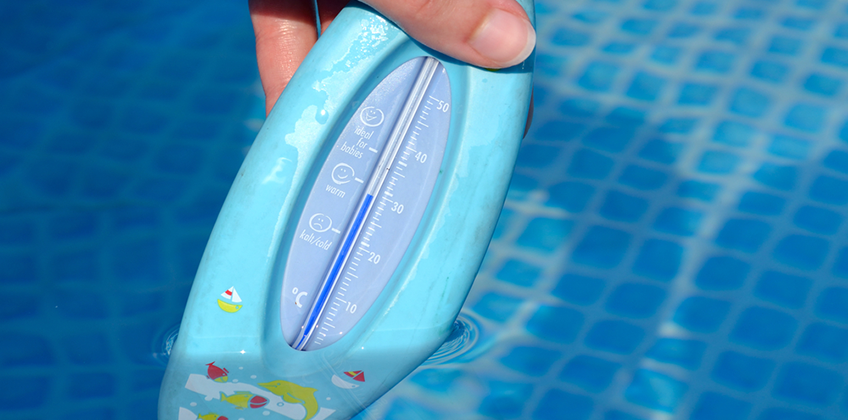
You might have heard of heat pump-style heaters, and wonder if they’re the same as electric units. If so, know that they’re completely different. That’s because the former heats up water with electricity, while the latter only uses it to extract residual heat from the air.
Which one is best for you depends on your particular needs.
Why Buy an Electric Pool Water Heater
If you’re not used to swimming in water so frigid it’ll put hair on your chest, you’ll most likely need a heater if you own a pool. In most areas of the world, swim season only lasts a depressingly brief three to four months. That means for much of the year, your personal swimming oasis will likely be much too cold to enjoy.
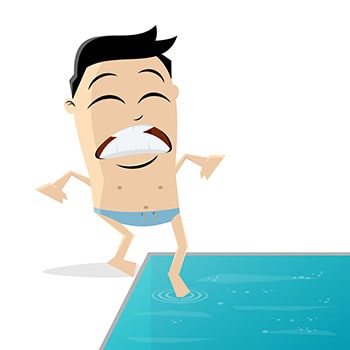
This can be a bummer, particularly when you’ve spent so much money on your backyard swimming oasis.
To rectify this problem, consider buying an electric pool heater of the electric variety, which can extend the season by up to two months. This means more time to splash around in the spring when the flowers are just starting to blossom.
It also means more opportunities to take refreshing dips in the autumn, when the leaves are falling and there’s a bit of a chill in the air. Buying an electric pool heater can also make family members happy who are sick and tired of swimming in water so bone-chillingly cold, it causes vital body parts to fall off.
Buying the best electric pool heater for your needs can mean the difference between your pool getting used regularly or sitting there empty and forlorn because nobody is crazy enough to brave the ice-cold water. It also means your high-priced investment gets enough use to make it worthwhile.
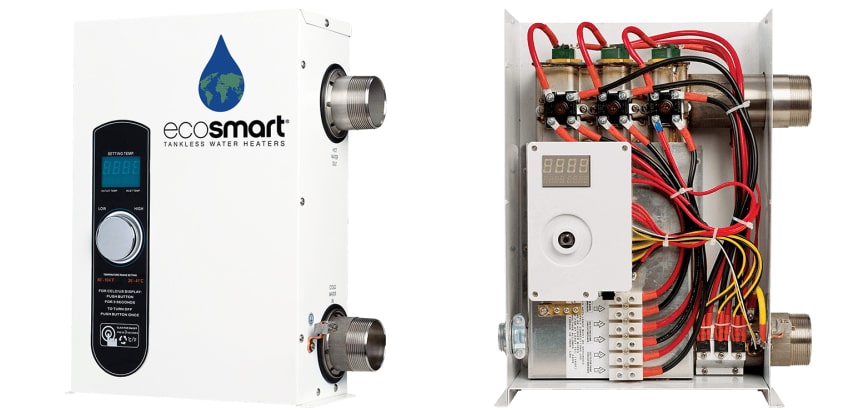
If you’re interested in all pool heater types, check out our comprehensive guide. You’ll have all the information you need to make a buying decision right at your fingertips.
Happy shopping!
The EcoSmart Smart Pool 27 Electric Pool Heater is our best-rated electric pool heater. Our comprehensive review tells you why.
We select, test, review and suggest the best products. We may earn a commission, if you buy something through our links.
Electric Pool Heater Pros and Cons
Easier to Install

Electric units are easier to install than most other types. If you’re handy, you might even be able to install one yourself. All you need is a pre-existing electrical line and you’re good to go.
Unlike gas-powered units, you can put them in a shed—even if ventilation is minimal. That’s because they don’t emit harmful gases such as carbon monoxide—unlike gas-powered models.
Cost Less
If you’re on a tight budget and are looking for a unit with minimal initial costs, consider investing in an electric pool heater. They’re usually cheaper to purchase and install than gas- or solar-powered ones.
Zero Greenhouse Gas Emissions

Because electric units don’t emit CO2, there’s almost no negative environmental impact. This makes them a smart choice for environmentally conscious consumers.
More Reliable
Looking for a model you can count on no matter what? If so, the best choice is an electric heater. That’s because electric units are the most reliable heater type when it comes to keeping your pool water pleasantly warm. Unless something happens to disrupt the electrical flow, your unit will always be able to heat your pool to a pleasant temperature.

Easy to Maintain
Besides keeping them clean and ensuring water is flowing, electric units require little if any maintenance. This is good news for consumers used to devices breaking down at the drop of a hat. However, having your heater inspected yearly by a licensed technician will help to ensure it lasts a good long time.
Drawbacks of Electric Pool Heaters

If you find it necessary to heat your pool water quickly to a high temperature, electric heaters are typically more costly to operate than other types. Because the amount of electricity they need might exceed your home’s current capacity, an electrician could need to make changes to your circuitry before installing your unit, which can be expensive. The month-to-month costs of an electric pool heater are usually higher than other models.
Electric Pool Heater FAQs

The amount of time it takes to raise the pool temperature depends on how big it is, outside temperature, your desired temperature, how much sunlight is hitting the water, type of unit, and whether your pool is in-ground or above-ground. Gas-powered units are usually quicker than other types, heating up a pool 20 degrees in 10 to 12 hours. One gas-powered unit that’s particularly effective at doing this is the Hayward W3H250FDP.
If you properly maintain them, electric units can last 10 years or more. In an age when most machines don’t make it past their third or fourth years, this is impressive.
Typically, you’ll need to run your electric pool heater eight to 12 hours a day to maintain an optimal swim temperature. Any more than that and you’re just wasting energy.
It’s not good to constantly run your electric pool heater. That’s because it’ll not only needlessly increase your electric bill but also place unnecessary wear and tear on your unit. Instead, run your heater to cycle on only when necessary.
How to Choose an Electric Pool Heater
BTU Output
A BTU (British Thermal Unit) measures how much energy is needed to raise the temperature of one pound of water by one degree Fahrenheit. Every electric pool heater comes with its own BTU output rating. Typically, the range is between 150,000 and 400,000 BTUs.
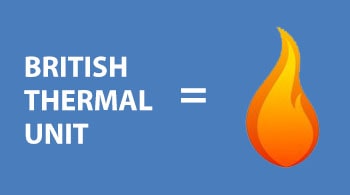
The higher the BTU rating, the faster a unit will heat up a pool. If you have a big pool, you’ll need a higher-rated heater. Otherwise, you’ll wait too long for your pool water to get up to temperature. A general rule is to get a unit with an output of at least 50,000 BTUs for every 10,000 gallons of water.
If you want to be more accurate, you can approximate what size unit you need by multiplying pool capacity in gallons by the weight of a single gallon of water (8.33 pounds). This is the number of BTUs you need to raise the temperature by one degree.
For example, let’s say you have a 15,000-gallon pool. Multiplying this by 8.33, we get 124,950.
If you need a more significant temperature increase, figure out the difference between your desired temperature and the coldest outside air temperature for your climate. Continuing with our example, we’ll say overnight air temperatures are 60 degrees Fahrenheit, and you want your pool water to be a balmy 80 degrees. This is a temperature differential of 20 degrees.
Multiply how many BTUs are needed to raise your pool temperature by one degree by the temperature difference. This gives you how many BTUs you need to increase the pool temperature to the desired level. Divide this number by how long you’re willing to wait for your pool to heat up. This gives you the BTU rating you need.
Continuing with our example, 124,950 times 20 equals 2,499,000. If you’re willing to wait 24 hours for your pool water to heat up, divide this number by 24. This gives us 104,125, which is the BTU rating you’ll need.
Pool Size
Which size electric heater you’ll need depends on the size of your pool. The bigger the volume, the harder your unit will need to work to raise the water temperature. This means that bigger pools need heaters with higher BTU ratings.
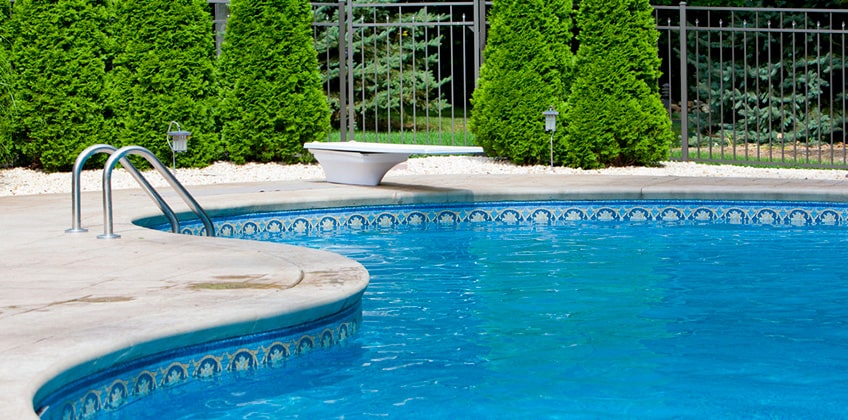
For example, if you have a spa, you’ll need a heater that can heat smaller amounts of water to higher temperatures. If you own a large pool and live in a warm climate, you probably can get by with a unit that heats water slowly to a lower temperature.
However, you also need to consider surface area. Bigger pools typically have more surface area, which means greater exposure to things that can dissipate heat, such as wind, sun, rain, and evaporation.
Frequency of Use
How often you use your pool is another factor in deciding which electric heater to get. If you use your pool every day, you’ll want to keep it at a constant temperature. You can do this with a smaller heater with a lower BTU rating that runs all the time.
If you only swim on weekends, it’s best to get a fast-heating, high-BTU-generating heater. For example, the EcoSmart Smart Pool 27. That way, you won’t waste energy on heating your pool for times you’re not using it.
Climate

The colder it is outside, the more powerful your heater needs to be. If you live in a warm climate, your heating needs will be less significant. If you live in a cold one, you’ll need more power at more frequent intervals.
Compatibility
It’s essential to check that the heater you’re planning on buying is compatible with your pool type. While most units are designed for use only in in-ground pools, there are some you can safely use in above-ground ones.
If you own a saltwater pool, ensure that the unit is corrosion-resistant. That way, internal components won’t rust out prematurely. Look for units with cupro-nickel heat exchangers instead of ones with copper heating elements, which can deteriorate more quickly.
Electric Pool Heater Installation
Installing an electric pool heater yourself is relatively simple if you’re good at DIY projects. You’ll save $300 to $1,000 by doing it yourself. However, if you need to install a water line, you might want to have a technician do it for you. That’s because that type of thing is best left to the professionals.

- Step One: Choose Location
Since you’ll be connecting your unit to a power outlet and your pool’s pump, you need to find a location near both. If you can’t, you’ll need to install an outlet near your heater or run PVC pipe to your pump.
- Step Two: Mount the Unit
Your unit must be mounted on a level base parallel to the ground. Allow six inches of clearance on all sides and at least 18 inches at the top and front to allow for repairs. Secure the unit to the base by using screws.
- Step Three: Connect Pipes
Your unit has an inlet and an outlet connection. Wrap Teflon tape around each to ensure a tight fit. Install the interfaces and tighten them so they don’t leak. If you’re installing the EcoSmart Smart Pool 27, don’t use glue or putty when preparing the interfaces. That’s because this could damage the flow sensors.
Use a wrench or ratchet with a socket attachment to tighten each component’s connection points. Don’t over-tighten them since this can damage components.Install a shutoff valve on the inlet pipe. Run the pump to allow water to circulate for five to 10 minutes. This purges all air from the water lines and must be done before turning the unit on. Failure to do this can permanently damage the heating elements.
- Step Four: Finish Installation
Connect the unit’s AC cable, turn on the pump and filter, and test the water near where it enters the pool. If it’s warm, congrats! Installation was successful.
How to Wire an Electric Pool Heater
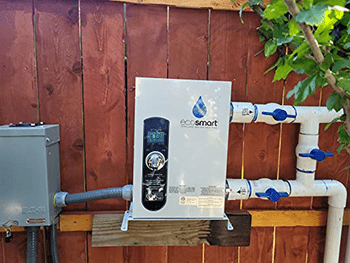
Wiring an electric pool heater is a job best left to a licensed electrical contractor. However, if you want to do it yourself and have expertise in this area, ensure that you do it according to local and national electrical codes. You’ll also need a permit.
Before installation, ensure that you have sufficient electrical capacity available to handle the amperage load of your model. Shut off the power before working on the circuits.
You’ll need three sets of wire and a ground. Take each set and connect them to a breaker. Make sure each breaker is connected with one black and one red wire.
Run the wire from the main breaker panel to the unit using a wire gauge that meets all applicable wire codes for the breaker size. A separate ground conductor for each circuit is necessary.
How Much Does an Electric Pool Heater Cost?
Are you wondering about electric pool heater cost? Let’s say you’re looking for one to keep your pool water all nice and toasty. In that case, you’ll typically shell out between $500 and $5,000 for initial purchase costs, with labor increasing the expense by $500 to $1,000.

If you don’t have electrical service near your pool, you’ll need an electrician to put in new circuits, which costs anywhere from $500 to $2,100. If a plumber needs to install water lines, add an additional $350 to $1,900. As far as ongoing expenses go, these units cost an average of $175 to $600 a month to keep them running.
You should only invest in an electric unit if temperatures in your region of the country rarely (if ever) get below 55 degrees Fahrenheit. Anything lower than that, and you’d be better off getting a gas-powered model.
Electric Pool Heaters for Above-Ground Pools
Electric heaters aren’t just for in-ground pools anymore—nowadays, you can buy them for above-ground ones too. Above-ground pool heater electric models are the type to buy if you own this kind of pool and there are preexisting electrical lines nearby.
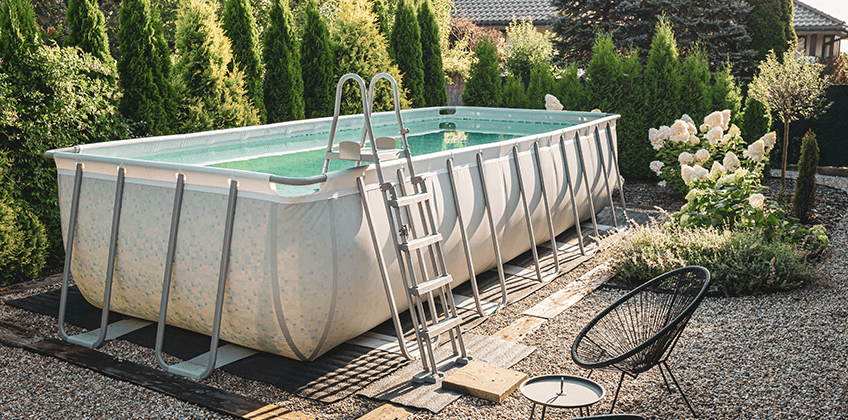
This is either a sub-panel with circuit breakers or if your residence’s inside panel isn’t too far away. Even if you have to have an electrician install new lines, it might be worth it if you want your pool water to be deliciously warm instead of bitterly frigid.
These types of units can’t be plugged in. Instead, you need to hard wire them.
You can save boatloads of cash on heating expenses by using a solar pool cover, which reduces the energy your heater needs to get your pool water hot enough. If you decide not to use one, get a unit one or two sizes larger than recommended. That way, you’ll ensure your pool water is always pleasantly inviting come swim time—something your family is sure to appreciate!

Pool Maintenance Tips & Tricks
